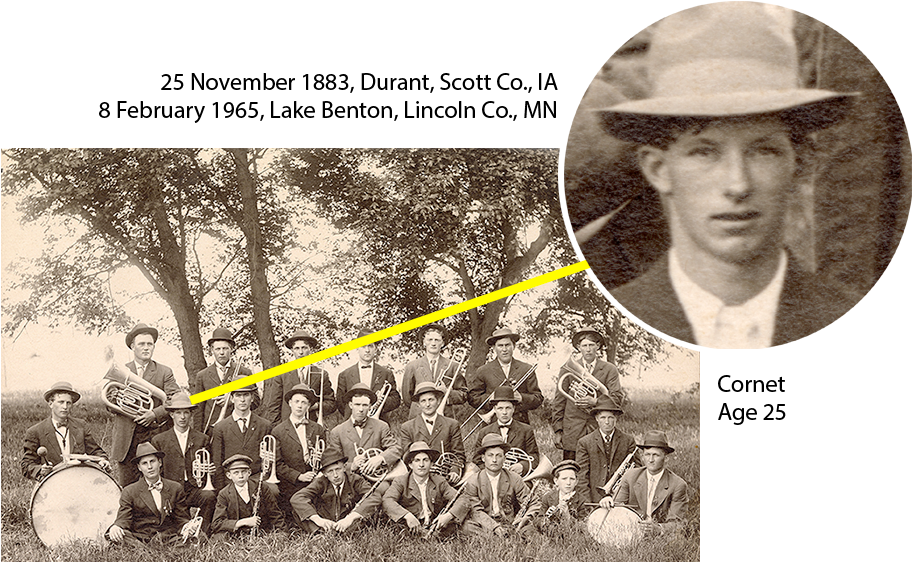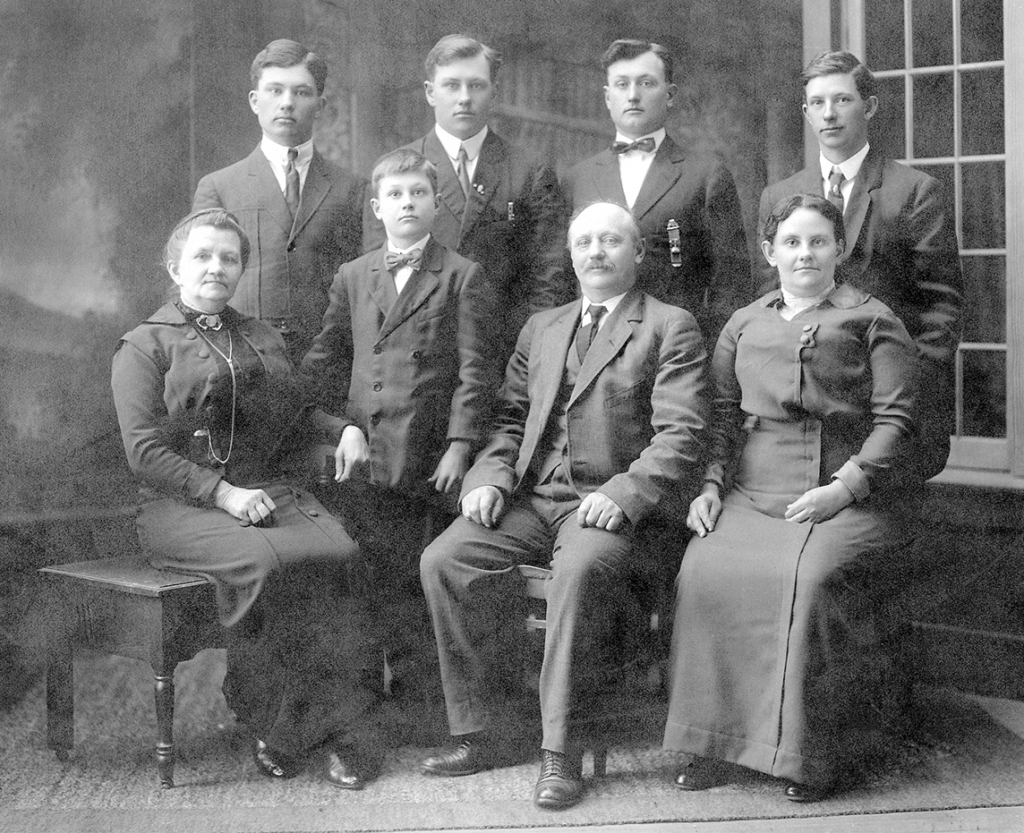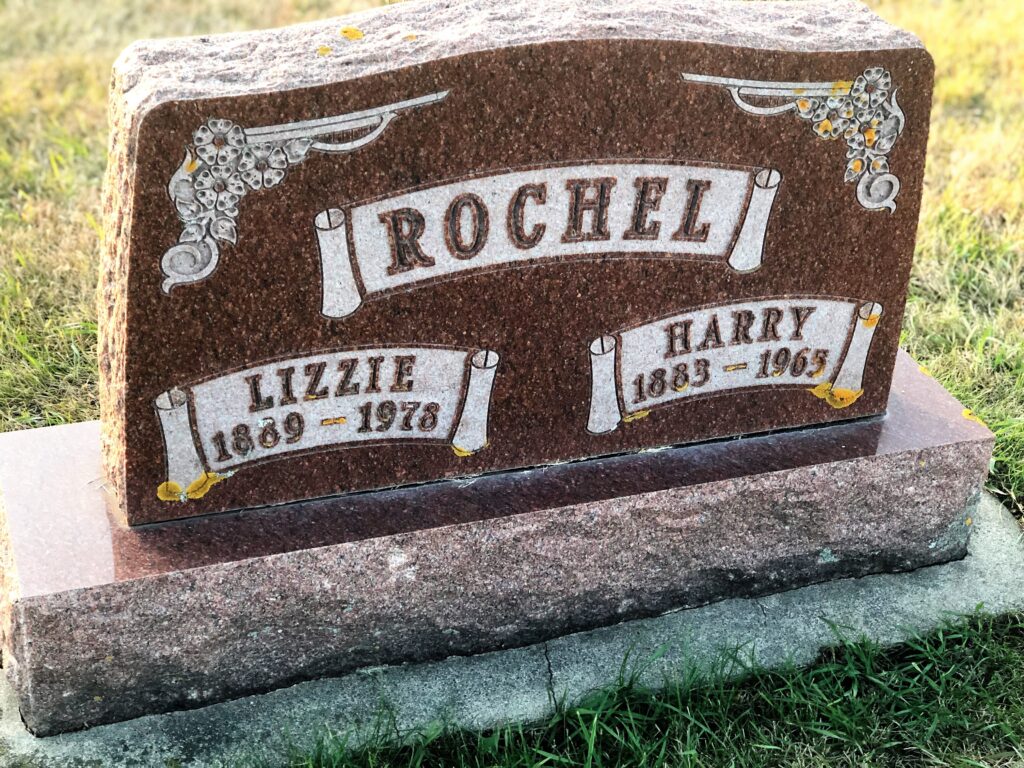
Harry Detlaf Rochel(1) was the older brother of another Calumet German Band member, Charles (“Charley”) Rochel (1888-1967), and the eldest of six children of Peter Holmer Rochel (1855-1942) and Maria “Mary” Stahl (1860-1947).(2) Like so many other band members, the family heritage was that of Schleswig-Holstein, where both Peter and Mary had been born. And like other German immigrants of this era, the family settled first near Davenport, Iowa (where the passenger railroad crossed the Mississippi River), then moved on — for a few years living in Tama County, where there was a large German immigrant community, then briefly in the adjacent Grundy County, and then moving to O’Brien County, in northwest Iowa.
Peter Holmer Rochel and Mary Stahl had married in Scott County, on 24 July 1883 (by which time she would have been several months pregnant with Harry). Both Harry and his sister Rosa (1886-1967) were born there, in the town of Durant (a small town that nevertheless spans three counties — Cedar, Scott, and Muscatine). The younger brother Charley may have been born in or near Berlin (Tama County), a town that in itself provides insight into the experience of German immigrants around the turn of the 20th century, because the town later changed its name in response to anti-German feelings during World War I.(3)

Two more children, John Phillip (1892-1980) and Emil Richard (1894-1972), were also born while the family lived in east central Iowa, but in 1900 they moved to O’Brien County, where the last child, Rudolph Donald “Rudy” (1901-1981), was born. There, Peter Rochel and his family farmed near the town of Paullina, a few miles northwest of Calumet, in Union Township, which is where Charley and Harry lived at the time of the band photo. A handsome portrait of the family was likely taken around this time.
By the time of the June 1909 band photo, Harry Rochel was married — making him among only three band members who were married at the time. (The others were Ralph Langley (1880-1977), who married in August 1902, and Hans Sievers (1888-1978), who married in January 1909.)
In fact, the Rochel brothers married sisters. Harry’s marriage, to Lizzie Annie Katherine Wede (1889-1978), took place on 3 February(4) 1907 in Sutherland. Lizzie was the older sister of Mary Alvina Wede (1890-1989), who married Charley Rochel in February 1910. Lizzie and Mary were the daughters of Heinrich Fredrick Wede (1861-1953) and Margaretha Ruther (1854-1957(5)), German immigrants who also hailed from Schleswig-Holstein.
The Rochel brothers were not alone among Calumet German Band members who married sisters. William “Willie” Shafer (1888-1954) and Ernest Shafer (1891-1964) also married sisters: Ella Eggers (1892-1990) and Kathrine “Katie” Eggers (1889-1974), respectively. In that case, the Eggers sisters were sisters also to another band member, William “Bill” Eggers (1886-1968). Remarkably, there was a third set of brothers in the band — John Mehrens (1889-1941) and Albert Mehrens (1891-1957) — although the Mehrens brothers did not follow the trend of marrying sisters.
Early in their married life, and at the time of this June 1909 photo, Harry and Lizzie farmed in Cherokee County, to the south of O’Brien County. There they suffered an infant death, of daughter Elsie, born in March 1908, who died 15 months later — and in fact her death took place only two weeks after this Calumet German Band photo was taken. At the same time, there was also happiness in the Rochel household, because the couple’s second child, Rosa (1909-1994), had been born exactly three days before this photo, on 6 June. The family was expanded with the birth of a son, Roy Henry (1911-1995), who was born two years later; and another son, Ralph Holmer (1913-1951), born two years after that.
The family then relocated to southwestern Minnesota, where Harry had a 160-acre farm near Lake Benton, in Verdi Township of Pipestone County. There the family’s last child, Ruby Marie (1914-2011), was born. Harry and Lizzie’s relocation seems to have led the way for other family members to join them in the region. The parents, Peter Holmer and Mary Stahl, moved to the town of Pipestone in 1920 and lived their remaining years there. Harry’s brother Charley, wife Mary, and their children farmed for many years near Elkton, South Dakota (just across the state line). And the youngest brother, Rudy, and his wife Lillian Eloise Hagedorn (1903-1964) and daughter Nyla Jeanne (1932-2018) farmed northwest of Pipestone for several decades.
In addition to his farming career, at some point Harry worked for the Chicago and North Western Railroad; he is listed on their employment records for 1935-1970 (although the records provide no further detail). By 1950, when he and Lizzie had retired to the town of Lake Benton, he reported working as a carpenter in the building construction business.

Harry and his younger brother Charles died only two years apart — Harry in 1965 and Charles in 1967. Harry and Lizzie, who lived for another decade after her husband’s death, are buried in Memorial Hill Cemetery in Lake Benton, Minnesota.

Subscribers to Ancestry.com may wish to further explore some family connections of Harry Rochel by accessing an Ancestry profile page (within the context of a “Mugge Family Tree”).
Connection to Other Band Members
See the biosketch for Harry Rochel’s brother Charles Hans “Charley” Rochel (1888-1967). These two brothers are related through direct family associations or in-law connections to fully half of the band members. Among these many connections, the closest are these:
• Harry and Charley Rochel and their bandmate William “Bill” Eggers (1886-1968) are first cousins. The father of Charley and Harry, Peter Holmer Rochel (1855-1942), was a brother of Bill Eggers’s mother, Kathryne Rochel (1849-1932).
• Thus there are also in-law cousin connections to bandmates William “Willie” Shafer (1888-1954) and his brother Ernest Shafer (1891-1964), who were married to two sisters of Bill Eggers: Ella Eggers (1892-1990), wife of Willie, and Kathrine Eggers (1889-1974), wife of Ernest.
These connections can be seen in a schematic, available here.
• Through the same Eggers family connection, Harry and Charley are connected to brothers John Mehrens (1889-1941) and Albert Mehrens (1891-1957); another of Bill Eggers’s sisters was Amanda Eggers (1884-1938), whose daughter Alice Meier (1906-1982) married Elmer Mehrens (1897-1955), younger brother of John and Albert. See a schematic of this connection.
And Harry and Charley Rochel are more distantly related to bandmates Charles Bandholz, Henry Friedrichsen, Ralph Langley, Henry Lorenzen, Henry Mugge, and Allie Sohm. Readers who seek more information about these connections may wish to contact John Mugge through the Contact form.
Footnotes
(1) The name was spelled Rochelle on the caption of the photo that The Des Moines Register published in 1964, and it sometimes appears that way in census records, probably the result of error by the census enumerator. All important primary sources (naturalization record for Peter Holmer Rochel, marriage records, passport applications, etc.) spell the name as Rochel. The pronunciation, at least in this U.S. wing of the family, is ro-SHELL.
(2) Some of the opening material for this biosketch repeats information that appears on the bio for Harry’s brother, Charley Rochel.
(3) As the U.S. prepared to intervene militarily in WWI on the side of the Allies, in April 1917, and continuing throughout the war, there was a wave of anti-German sentiment and personal violence both nationally and in Iowa, the home to many recent German immigrants. Anti-German feelings ran so high that a proclamation, known as the “Babel Proclamation,” was issued by Iowa Gov. William L. Harding in May 1918, which forbade the speaking of any language in public other than English. There were also more permanent actions nationally, including the renaming of many place names, especially street names in major cities such as Chicago, Cincinnati, and Indianapolis. In the small town of Berlin, which like other areas of Tama County had seen an influx of German immigrants, the wave of verbal and physical abuses against its citizens caused the town to rename itself on 12 June 1918 as Lincoln. See this site’s more extensive discussion of anti-German feelings in “WWI & Anti-German Sentiment,” a subsection of “The Cultural Milieu.”
(4) Likely date. Because of an erasure, the marriage register is slightly unclear.
(5) Note that Margaretha Ruther lived to the very advanced age of 102. She and Heinrich Wede were able to celebrate their 68th wedding anniversary shortly before his death. Upon her own death, Margaretha was survived by 14 grandchildren, 52 great-grandchildren, and 10 great-great-grandchildren.
